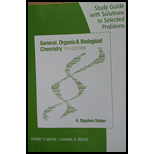
Concept explainers
(a)
Interpretation: To identify whether the statement “the pool is a mix of all 20 standard amino acids” relating to the body’s amino acid pool is true or false.
Concept introduction: The total free amount of amino acid available for use in the body constitutes the amino acid pool. Dietary protein is one of the sources of the contribution of free amino acid to the amino acid pool. Dietary proteins upon complete degradation result in the formation of free amino acid which then enters into the amino acid pool. Amino acids present in the amino acid pool are used in 4 different ways in varying percentage.
(b)
Interpretation: To identify whether the statement “the main use for the pool’s amino acids is protein synthesis” relating to the body’s amino acid pool is true or false.
Concept introduction: The total free amount of amino acid available for use in the body constitutes the amino acid pool. Dietary protein is one of the sources of the contribution of free amino acid to the amino acid pool. Dietary proteins upon complete degradation result in the formation of free amino acid which then enters into the amino acid pool. Amino acids present in the amino acid pool are used in 4 different ways in varying percentage.
(c)
Interpretation: To identify whether the statement “dietary protein is the sole source of amino acids for the pool” relating to the body’s amino acid pool is true or false.
Concept introduction: The total free amount of amino acid available for use in the body constitutes the amino acid pool. Dietary protein is one of the sources of the contribution of free amino acid to the amino acid pool. Dietary proteins upon complete degradation result in the formation of free amino acid which then enters into the amino acid pool. Amino acids present in the amino acid pool are used in 4 different ways in varying percentage.
(d)
Interpretation: To identify whether the statement “only essential amino acids can be withdrawn from the pool” relating to the body’s amino acid pool is true or false.
Concept introduction: The total free amount of amino acid available for use in the body constitutes the amino acid pool. Dietary protein is one of the sources of the contribution of free amino acid to the amino acid pool. Dietary proteins upon complete degradation result in the formation of free amino acid which then enters into the amino acid pool. Amino acids present in the amino acid pool are used in 4 different ways in varying percentage.
Trending nowThis is a popular solution!

Chapter 26 Solutions
Study Guide with Selected Solutions for Stoker's General, Organic, and Biological Chemistry, 7th
- Synthesize 2-Ethyl-3-methyloxirane from dimethyl(propyl)sulfonium iodide using the necessary organic or inorganic reagents. Draw the structures of the compounds.arrow_forwardSynthesize 2-Hydroxy-2-phenylacetonitrile from phenylmethanol using the necessary organic or inorganic reagents. Draw the structures of the compounds.arrow_forwardSynthesize N-Methylcyclohexylamine from cyclohexanol using the necessary organic or inorganic reagents. Draw the structures of the compounds.arrow_forward
- Synthesize N-Methylcyclohexylamine from cyclohexanol using the necessary organic or inorganic reagents. Draw the structures of the compounds.arrow_forwardIf possible, please provide the formula of the compound 3,3-dimethylbut-2-enal.arrow_forwardSynthesize 1,4-dibromobenzene from acetanilide (N-phenylacetamide) using the necessary organic or inorganic reagents. Draw the structures of the compounds.arrow_forward
- Indicate the products obtained by mixing (3-oxo-3-phenylpropyl)triphenylphosphonium bromide with sodium hydride.arrow_forwardWe mix N-ethyl-2-hexanamine with excess methyl iodide and followed by heating with aqueous Ag2O. Indicate the major products obtained.arrow_forwardIndicate the products obtained by mixing acetophenone with iodine and NaOH.arrow_forward
- Indicate the products obtained by mixing 2-Propanone and ethyllithium and performing a subsequent acid hydrolysis.arrow_forwardIndicate the products obtained if (E)-2-butenal and 3-oxo-butanenitrile are mixed with sodium ethoxide in ethanol.arrow_forwardQuestion 3 (4 points), Draw a full arrow-pushing mechanism for the following reaction Please draw all structures clearly. Note that this intramolecular cyclization is analogous to the mechanism for halohydrin formation. COH Br + HBr Brarrow_forward
 Chemistry for Today: General, Organic, and Bioche...ChemistryISBN:9781305960060Author:Spencer L. Seager, Michael R. Slabaugh, Maren S. HansenPublisher:Cengage Learning
Chemistry for Today: General, Organic, and Bioche...ChemistryISBN:9781305960060Author:Spencer L. Seager, Michael R. Slabaugh, Maren S. HansenPublisher:Cengage Learning General, Organic, and Biological ChemistryChemistryISBN:9781285853918Author:H. Stephen StokerPublisher:Cengage Learning
General, Organic, and Biological ChemistryChemistryISBN:9781285853918Author:H. Stephen StokerPublisher:Cengage Learning Organic And Biological ChemistryChemistryISBN:9781305081079Author:STOKER, H. Stephen (howard Stephen)Publisher:Cengage Learning,
Organic And Biological ChemistryChemistryISBN:9781305081079Author:STOKER, H. Stephen (howard Stephen)Publisher:Cengage Learning, Introductory Chemistry: A FoundationChemistryISBN:9781337399425Author:Steven S. Zumdahl, Donald J. DeCostePublisher:Cengage Learning
Introductory Chemistry: A FoundationChemistryISBN:9781337399425Author:Steven S. Zumdahl, Donald J. DeCostePublisher:Cengage Learning
 World of Chemistry, 3rd editionChemistryISBN:9781133109655Author:Steven S. Zumdahl, Susan L. Zumdahl, Donald J. DeCostePublisher:Brooks / Cole / Cengage Learning
World of Chemistry, 3rd editionChemistryISBN:9781133109655Author:Steven S. Zumdahl, Susan L. Zumdahl, Donald J. DeCostePublisher:Brooks / Cole / Cengage Learning





